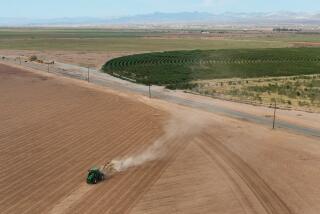Deal with warming, don’t debate it, scientists warn
A United Nations report released Friday that blames humans for the “runaway train” of global warming has abruptly shifted the international debate from “Are humans to blame?” to “What are we going to do about it?”
“The world’s scientists have spoken,” said Timothy E. Wirth, president of the United Nations Foundation. “It is time now to hear from the world’s policymakers. The so-called and long-overstated ‘debate’ about global warming is now over.”
The 21-page report, released in Paris by the Intergovernmental Panel on Climate Change, proposed no solutions. There is no world consensus on how best to bring about the radical restrictions in emissions that would be needed to mitigate global warming.
The most significant effort to reach a common solution was the 1997 Kyoto Protocol, which so far has not had much impact.
The report said that it was “unequivocal” that global warming was occurring and that it was at least 90% certain humans were responsible. It predicted temperatures would rise 3.2 to 7.2 degrees Fahrenheit by 2100 and that sea level would rise 7 to 23 inches, perhaps more.
If the Greenland ice sheet were to melt completely, it would lead to a 21-foot increase in sea level, forcing the relocation of more than 300 million people living in low-lying areas worldwide.
The report also said warming would continue even in the extremely unlikely event that global carbon dioxide could be stabilized at its current level. Such a stabilization would require an immediate 70% to 80% reduction in emissions, said Richard Somerville of the Scripps Institution of Oceanography in La Jolla.
Although most of the scientific data behind the report have come out before, their aggregation into a single report, phrased in the boldest of terms, sparked an intense reaction Friday.
“The degree of certainty, which was already very high, is now as close to certain as scientists are willing to say,” said former Vice President Al Gore, a longtime champion of environmental issues whose documentary on global warming, “An Inconvenient Truth,” is nominated for two Oscars.
Echoing a phrase that was widely heard Friday, Rep. Edward J. Markey (D-Mass.) called the report “a scientific smoking gun.”
The warming would have a powerful impact on California and the Southwest, with hotter weather, less rainfall and a loss of water supply because of the diminishing snowpack in the Rocky Mountains.
Deflecting criticism
Bush administration officials downplayed the United States’ contribution to global warming.
“We are a small contributor when you look at the rest of the world,” Energy Secretary Samuel Bodman said in a Friday teleconference.
The U.S. is the single largest contributor to global warming, producing about a quarter of the world’s carbon dioxide emissions even though it accounts for about 4.5% of its population.
China, with 20% of the world’s population, produces 14.5% of global emissions.
The proportion of emissions contributed by the U.S. is decreasing, however, as developing nations, particularly China and India, build up their economies.
Though global warming cannot be reversed, it can be mitigated, said climatologist Gerald Meehl of the National Center for Atmospheric Research in Boulder, Colo. If emissions are reduced, “we’ll have fewer climate changes and less warming. If they are higher, we’ll have much greater changes. The longer you wait to begin reducing emissions, the worse the problem gets and the more you have to do to do something about it.”
The report is the fourth in a series compiled by 2,500 scientists from 130 nations. Although the projections in the report have not changed substantially from those of the last study, scientists’ confidence in the assertions has increased sharply.
Compiling the report has been a large international effort with 16 climate modeling groups from 11 countries working independently. “What’s really striking ... is that the models keep improving with time, but the answers don’t keep changing,” Meehl said. “That allows us to say with a lot more confidence what we are looking at.”
And since the last report was issued, “we have six years of new data, and they are among the seven warmest years on record,” said climatologist Kevin Trenberth of the National Center for Atmospheric Research.
The data show that the warmth of the last half century “is unusual in at least the previous 1,300 years,” the report said, and the last time the polar regions were significantly warmer for an extended period was about 125,000 years ago. That warming was caused by changes in Earth’s orbit and led to melting of the Greenland ice cap.
As warming continues, it will produce wide changes in regional climates, including: more droughts in the tropics and subtropics; more heat waves; fewer frosts; heavier rains, particularly in Canada, the U.S. Northeast and South America’s eastern coast; a retreat of the polar ice caps; less snow cover in the Northern Hemisphere; less-saline ocean water because of the increased precipitation; and more intense hurricanes, though they won’t become more frequent.
Sea level rises will cause flooding in low-lying areas, such as the island nation of Kiribati in the western Pacific Ocean, the southern tip of Florida and the lower half of Louisiana.
In Southern California, the modest rise in sea level forecast in the report would probably endanger beaches that are less than 100 feet wide, which account for more than half the state’s coastline, said Reinhard Flick, an oceanographer with the California Department of Boating and Waterways.
“They are very likely to be lost if we see anything like a 1- to 3-foot rise in sea level,” he said. “A lot of these beaches can be in trouble.”
The average temperature in the Southland will probably increase by about 8 degrees by the end of the century and rainfall will decrease, according to climatologist Linda Mearns of the National Center for Atmospheric Research. What rain does fall will evaporate more quickly because of higher temperatures, accentuating the dryness of the climate.
The region’s water supply will also be imperiled because in the Rocky Mountains, which provide much of the water for the Southwest, the snow season will be shorter and the snowpack diminished.
“Sections of this report read like the Book of Revelations,” said Moira Chapin of Environment California.
Yvo de Boer, executive secretary of the U.N. Framework Convention on Climate Change, called for a summit of global leaders to address the problem. “The findings ... leave no doubt as to the dangers that mankind is facing and must be acted upon without delay,” he said.
French President Jacques Chirac echoed the call, saying, “Now is not the time for half measures.... We are in truth on the historical doorstep of the irreversible.”
Curbing emissions
The only previous effort to reduce global emissions was the Kyoto Protocol, which proposed carbon dioxide emission caps for the 35 richest countries. The United States, where emissions are increasing about 1% a year, withdrew from the pact in 2001, contending it was unfair because it did not set limits for developing nations.
Bodman said Friday that the U.S. would not cap emissions because that would lead to a transfer of jobs and industries abroad. “You would have the U.S. economy damaged on the one hand, and the same emissions -- in fact, potentially even worse emissions because in many of those countries they don’t have the same kind of standards,” he said.
Bodman also noted that the U.S. had spent $29 billion on global warming research, technology development and other initiatives -- “more than the rest of the world combined.”
Countries that agreed to the Kyoto pact are having trouble meeting its goals. Canada’s emissions, for example, are a third higher than levels the country agreed to reach by 2012, and Canadian Prime Minister Stephen Harper says the goal is unachievable.
Scientists said it was not too late to take steps toward emission controls, but “it is later than we think,” said atmospheric scientist Susan Solomon of the National Oceanic and Atmospheric Administration, who co-chaired the panel that produced the summary.
karen.kaplan@latimes.com







